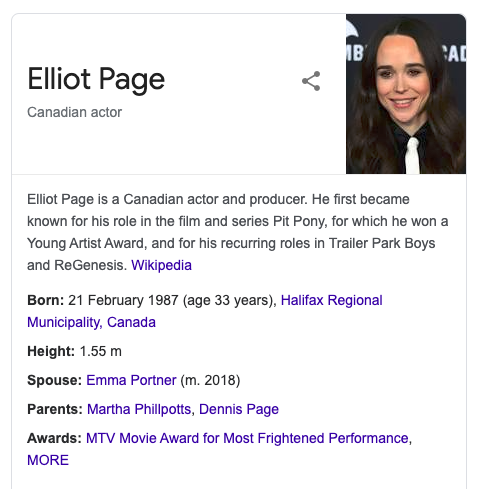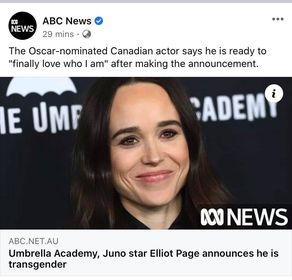December 2, 2020
Ellen Turns A New Page
Ellen Page, the brilliant young star of Juno, The X-Men franchise, and lately the Netflix series, The Umbrella Academy, is now Elliot Page, having announced that she is trans.
I say “she” advisedly, as Page has now offered the preferred pronouns of “they/he” to the world to use.
Elliot Page has presented to the world, and Ellen Page is no more. And history must reflect this new reality. In the same way that statues to the past – a brutal past – were torn down this year, ready for history to be rewritten, the likes of Wikipedia were pronto onto the news.
So we get this:

Wikipedia was quick off the mark. While acknowledging on Page’s page the changes that have occurred, the key factor is that Wiki – and so much other social media – photoshops history out of the equation from the get-go. They no doubt have writers on hand to do this as quickly as possible, lest they be accused of dead-naming, and therefore brought into disrepute in this most hedonistic of Puritanical ages.
The fact that this screenshot above says that “he first became know for his role in the film“, simply bears this out. History will show that a woman called Ellen Page played that role. It will if you’re quick to look for such history. Social media will have changed reality in a nano-second, but the age of the DVD was still upon us back when that film was made, so there will be some pesky reality to adjust. A DVD burning perhaps to ensure all is smooth?
Language is now hostage to the soft tyranny of big tech and its ability to rewrite history. Orwell would be proud.
I personally believe that we should tread carefully around those who suffer gender dysphoria and take that very seriously indeed. We must be kind-hearted and other person centred, and not merely push our own particular cultural or spiritual barrow with those who are experiencing this.
I’m also never sure where gender dysphoria is the concern and where a social/cultural phenomenon is occurring.
Page was lesbian, is married to woman, and now is a female to male transgender person.
The complexities, twists and turns in that one sentence alone reveals the cultural confusion we are experiencing. Hey, I even used the word “married” when i clearly don’t believe that a marriage between a woman and a woman is an actual marriage, beyond what the various governments of the world decide.
Why did I use the word “married” I ask myself? Why would I use any word to describe something that isn’t what I believe it to be, given the propensity of language to shape my thinking? It’s easier, that’s why. Not easier in the sense that I care if people abuse me for it, but easier than writing a whole sentence/paragraph/essay to explain why I don’t believe it.
A verbal Stalinist purge is complete when I choose to take the easier option. I am not sure I have a problem with helping someone with gender dysphoria feel more comfortable by my use of language. But something in me says that’s a sugar rush for which I will pay for later when I succumb to a bad case of linguistic diabetes.
I’ve always said it, this is a battle over language. And language is theological. And since language is theological, it is concerned with the truth. The ABC here in Australia shows a similar disinterest in the nuances of what has happened to page, with this headline:

So many bumps in the road of that statement. The star of Juno was Ellen. Can we not even admit to that history any longer? At least Page herself acknowledges that there has been a process here with that “finally love who I am” statement. A verbal Stalinist purge is complete.
Which of course is hard to believe. How can there by anything final? At all? Everything is in a constant state of flux and the high suicide rate of transgender people cannot be slated home to the unfortunate hate-filled messages Page will undoubtedly receive.
Meanwhile a master – or mistress? – of language herself (and she is solidly a “herself”), JK Rowling, receives equivalent hate messages and threats of murder and rape from online transgender trolls.
Online transgender trolls who are ostensibly men, given that they threatened to do Rowling over with a certain appendage. Either we admit that women are as threatening and violent as men are, given the language they use against their opponents in public, or we admit that those are the threats and violence that men use against women, and judge those characters accordingly.
Of course it’s just Hollywood. Which of course it isn’t. It’s the most shaping and often the most spiritually toxic influence on our lives. I took my son to see Onward the other day, another wonderful Pixar movie that was all about daddy issues (again!). We hadn’t been to a movie since pre-COVID, but it was only one cartoon trailer in that we heard the immortal (actually morbidly mortal) line “Do what your heart tells you to do!” What? Are they not even embarrassed with their lack of originality?
Well Page’s heart has told her to become a he. And who is to judge her heart? At the, er, heart, of the Sexular Age in which we live is the conviction that our deepest authenticity is found within ourselves.
Deep, inner personal transformation is possible by us, for us, and through us. And only we know what that means for us. And for Ellen, loosing the surly bonds of her womanhood has given her the freedom that Elliot needs. And dare we say otherwise? Yes, we dare, but it will come at a cost.
The soft tyranny we are experiencing would be recognised by that great Czech leader and dissident, Vaclav Havel, who in a stunning essay, The Power of the Powerless: on freedom and language describes the greengrocer who is sent a sign from the Soviet State to put in his window. He does not believe the truth of that sign, but has himself signed up to an easier life. He will take the road more travelled for the sake of personal safety.
Havel observes that what we are giving up when we align ourselves with this soft velvet glove, hiding an iron fist, is the very ability to discern between truth and lie, right and wrong. We are giving up theology for ideology:
Ideology is a specious way of relating to the world. It offers human beings the illusion of an identity, of dignity, and of morality while making it easier for them to part with them. As the repository of something suprapersonal and objective, it enables people to deceive their conscience and conceal their true position and their inglorious modus vivendi, both from the world and from themselves. It is a very pragmatic but, at the same time, an apparently dignified way of legitimizing what is above, below, and on either side. It is directed toward people and toward God. It is a veil behind which human beings can hide their own fallen existence, their trivialization, and their adaptation to the status quo. It is an excuse that everyone can use, from the greengrocer, who conceals his fear of losing his job behind an alleged interest in the unification of the workers of the world, to the highest functionary, whose interest in staying in power can be cloaked in phrases about service to the working class. The primary excusatory function of ideology, therefore, is to provide people, both as victims and pillars of the post-totalitarian system, with the illusion that the system is in harmony with the human order and the order of the universe.
And that statement is worth far much more than the particular page it was written on.
Written by
There is no guarantee that Jesus will return in our desired timeframe. Yet we have no reason to be anxious, because even if the timeframe is not guaranteed, the outcome is! We don’t have to waste energy being anxious; we can put it to better use.
Stephen McAlpine – futureproof
Stay in the know
Receive content updates, new blog articles and upcoming events all to your inbox.


